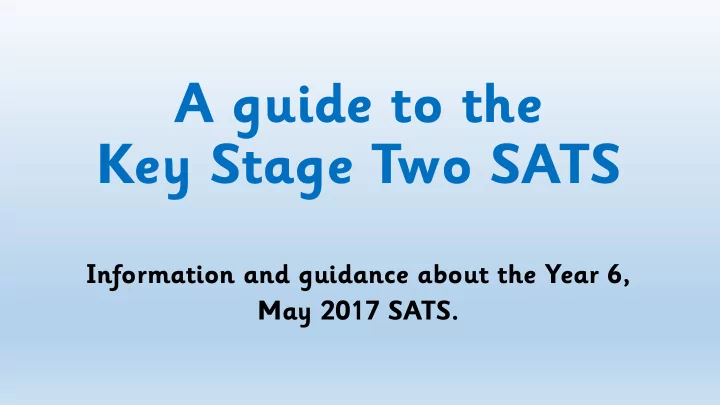

A guide to the Key Stage Two SATS Information and guidance about the Year 6, May 2017 SATS.
Key Stage 2 SATS Changes • In 2014/15, a new national curriculum framework was introduced by the Government. The current year 6 were in year 4, at this time. • In May this year, the Year 2 and Year 6 pupils were tested through SATS on the new curriculum for the first time. • If your child is in Year 6 this year, they will be the second set of pupils to receive the new style SATS tests and to receive the new style of reporting results.
Assessment and Reporting • ‘Old’ national curriculum levels (e.g. Level 3, 4, 5) have now been abolished, as set out in the government guidelines. • The new curriculum is more rigorous and sets high expectations which all schools have to work hard to meet. • From 2016, test scores are reported as ‘scaled scores’.
Scaled Scores • A score of 100 will represent the ‘national standard’. Each pupil’s score from the test will be converted into a score on the scale. • The scale will have a lower end point (last year it was 80) and an upper end point (last year it was 120). • A child who achieves the ‘national standard’ (a scaled score of 100) will be judged to have demonstrated sufficient knowledge in the areas assessed by the tests. • A scaled score of 80 – 99 means they are below age expected standards. Above 100 means they have exceeded age expected standards.
Higher Attaining Pupils • Previous Key Stage 2 tests were aimed at children achieving Levels 3-5 (with a national expectation to reach at least Level 4). • In the past, additional Level 6 tests were produced for children who demonstrated higher than expected attainment, above Level 5. • As from May 2016, there are not any separate tests for the most able children. Instead, each test will have scope for higher attaining pupils to show their strengths.
The Tests • Key Stage 2 SATs take place nationally in the week commencing 8th May 2017. • Statutory tests will be administered in the following subjects: o Reading (60 minutes) o Spelling (approximately 15 minutes) o Punctuation, Vocabulary and Grammar (45 minutes) o Mathematics (3 Papers, 30 mins, 40 mins and 40 mins) • All tests are externally marked. • Writing will be ‘Teacher Assessed’ internally, as in recent years .
Reading • The Reading Test consists of a single test paper with three unrelated reading texts. • Children are given 60 minutes in total, which includes reading the texts and answering the questions. • A total of 50 marks are available. • Questions are designed to assess the comprehension and understanding of a child’s reading. • Some questions are multiple choice or selected response, others require short answers and some extended responses or explanations.
Spelling, Punctuation, and Grammar • A Spelling test is administered containing 20 words, lasting approximately 15 minutes. • A separate test is given on Punctuation, Vocabulary and Grammar. • This test lasts for 45 minutes and requires short answer questions, including some multiple choice. • Marks for these two tests are added together to give a total for Spelling, Punctuation and Grammar.
Maths • Children will sit three tests: Paper 1, Paper 2 and Paper 3. • Paper 1 is ‘Arithmetic’ lasting 30 minutes, covering calculation, including use of fractions, percentages and decimals. • Questions gradually become harder. Not all children will be expected to access some of the more difficult questions. • Papers 2 and 3 cover ‘Problem Solving and Reasoning’, each lasting for 40 minutes. • Pupils will still require calculation skills but will need to answer questions in context and decide what to do to find a solution.
How to help your child • First and foremost, support and reassure your child that there is nothing to worry about and they should always just try their best. • Ensure your child has the best possible attendance at school. • Encourage children to be prepared and have the things they need, such as reading records. • Support your child with any homework tasks. • Reading, spelling and arithmetic (e.g. times tables) are always good to practise. Talk to your child about what they have learnt at school and what book(s) they are reading (the character, the plot, their opinion). • Praise and encourage your child, even for small successes.
Recommend
More recommend